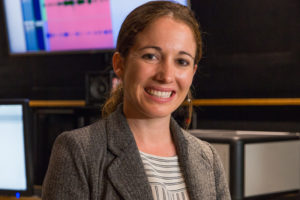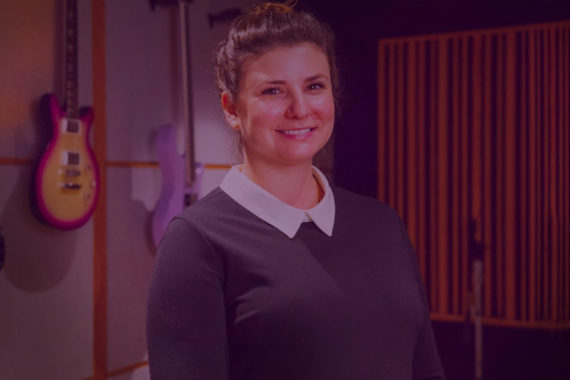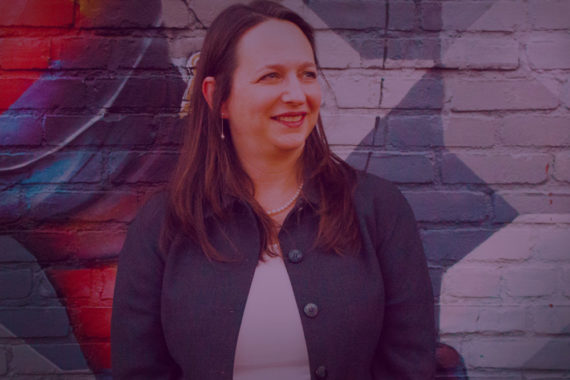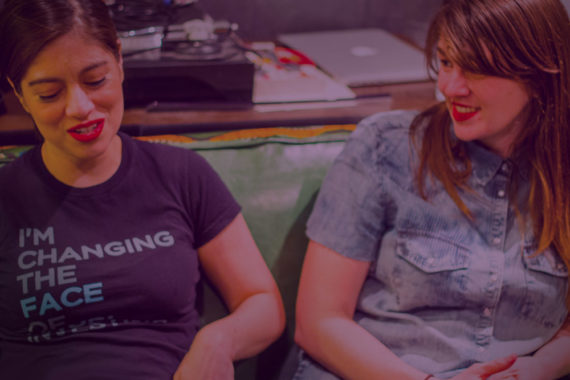
Lisa Curtis, CEO, Kuli Kuli
(photo credit: Sandra Garcia)
Pitch Makeover host Natalia and Gina get the 60-second pitch from Lisa Curtis, CEO of Kuli Kuli, which makes bars and powders from moringa, a superfood found in Latin America, Asia, and Africa. In the Legal Minute, Mitzi Chang of Goodwin on when you need a legal specialist. Plus, this week’s Investor Take from Ruth Ann Harnisch of The Harnisch Foundation.
Music courtesy of Seven Seas Music (a Pipeline Angels portfolio company!)
EPISODE TRANSCRIPT
Natalia: Hi everyone, my name is Natalia Oberti Noguera. I am the Host and Creator of Pitch Makeover and I’m also the Founder and CEO of Pipeline Angels, where we are changing the face of angel investing and creating capital for women and non-binary femme social entrepreneurs.
Gina: And I’m Gina Delvac, the Founding Executive Producer of Pitch Makeover. We’re taking the concept of a fashion makeover and applying it to startup pitches. Entrepreneurs pitch, we talk, and then we share some feedback on what they should keep, delete, and maybe even more important—add to their pitch. Our goal—help more voices, as Rihanna says, shine bright like the diamonds that they are.
And after the Pitch Makeover we have the Legal Minute with Mitzi Chang of Goodwin, answering burning startup legal questions, followed by First Pitch. And stay till the end for this week’s Investor Take from Ruth Ann Harnisch of The Harnisch Foundation.
Gina: Welcome to Pitch Makeover [1:00], I’m producer Gina Delvac and your co-host for today along with Natalia. Hi Natalia!
Natalia: Hey Gina!
Gina: We’re here with another great entrepreneur Lisa Curtis from Kuli Kuli. Lisa, are you ready for your one minute pitch?
Lisa: I am!
Gina: Ready? Set? Pitch!
Lisa: Hi! My name is Lisa Curtis and I’m the Founder and CEO of Kuli Kuli. We’re the first company to pioneer moringa in the U.S.. You may not have heard of it but NPR just called it “the new kale” and the Wall Street Journal called it “the next hot trend in food.” Moringa’s a green. It grows all over the tropics and it’s more nutrient dense than kale, providing a complete protein, a lot of calcium, iron and vitamins. I started working with it in the Peace Corps and then founded Kuli Kuli to support more women in the developing world to grow and benefit from moringa while selling an *amazing* healthy green here in the U.S. in the form of powders, bars, and energy shots. So we’re now in about three thousand stores nationwide, we recently completed our Series A which was [2:00] actually led by the Kellogg company’s new venture fund 1894 and we’re super excited to be able to scale up our operations and bring this super food to more people here in the U.S. while benefiting women and planting moringa trees around the world.
Gina: Fifty-six seconds.
Natalia: Lisa, you mentioned in your pitch that you just closed your Series A that was led by the Kellogg fund. First of all, congrats! That’s so exciting!
Lisa: Thank you.
Natalia: And of course we’re thrilled to count Kuli Kuli as a Pipeline Angels portfolio company. You’re making us proud. For those who might not know, talk a little bit more about Kellogg fund. Is it, for example, related to the food player?
Lisa: Yeah, so Kellogg’s new venture arm 1894 is an offshoot from the Kellogg company, the maker of Frosted Flakes, and Pop Tarts, and a lot of other amazing foods like Kashi and Morning Star. And so we are actually the first investment from their fund and one of the things that really attracted us about the Kellogg [3:00] new fund 1894 was that not only were they offering money, but they were also incredible value added investor in connecting us to retailers and really helping us scale up our business in a bigger way. And they’ve been very supportive of our social mission from the beginning and have actually helped encourage us to become a full-fledged benefit corporation, so to really embed our social mission into our legal DNA.
Natalia: So—so talk a little bit more about how your company is supporting women.
Lisa: Yeah! So, we are sourcing primarily from women-led farming cooperatives. So, we’re sourcing from groups in Ghana, in Haiti, and in Nicaragua. And we work directly with the farmer. So, unlike a lot of companies that use a broker or, you know, other middle-men and don’t actually know where their food is coming from. We know how it’s grown, we’ve been to visit all the farms, we know the farmers, we know how they’re paid, and we make sure [4:00] that everything is as sustainable and fair as possible. We also partner with some really amazing non-profits on the ground to help encourage more farmers to be not only growing moringa to sell, but growing it to eat. And really providing that nutritional education on how it can benefit them and their families.
Natalia: Lisa, you mentioned—and by the way, I love that you included that NPR is calling moringa “the new kale”—you also said that the Wall Street Journal called it something else. What—what did they call it?
Lisa: “The next hot trend in food” is what the Wall Street Journal called moringa.
Natalia: The next hot trend in food…thanks to WSJ and NPR for making your job as an entrepreneur easier. [Both laugh]
Lisa: Definitely! I think putting some validity behind it. We’ve seen it for—with our own eyes, and just in terms of how fast the company has grown and the performance of the product on shelf, there are *a lot* of people really interested in moringa. And particularly [5:00] people who have grown up eating it. So there are a lot of folks from the Filipino community, from the Latino community, from the Af—different African countries, who’ve all grown up eating moringa and know of the amazing medicinal properties in addition to the nutritional properties and they seek it out for that.
Natalia: And…you know, tell us a little about your founding team. Is there someone in your team that grew up eating moringa, yet?
Lisa: Yeah, so we have a pretty amazing, diverse team. I would say we are majority minority. It’s interesting because we all come from different backgrounds. There’s a fair contingent of us now that got introduced to moringa from the Peace Corps. But a lot of folks who got introduced to it traveling abroad. There’s…I would say, no one on our team—on our team in Oakland that grew up eating it. But of course our farmers and our partners, who we work very closely with where we grow the moringa, have grown up [6:00] eating moringa.
Natalia: That’s great. Are you ready for your pitch makeover, Lisa?
Lisa: I am! Yeah!
Natalia: So, I’d love for you to keep the “what is it?” You know, I’m sure that even though NPR and the WSJ are helping you out Lisa, that you still probably need to give a lot of moringa 101s out there. So, let’s keep the what it is—what is moringa in your pitch. Also, I love that you included your story of how you got into moringa. The story about the Peace Corps and how that probably influenced even how you viewed that it’s not just about, like, what a great food. You already were thinking about that two way street of how it’s adding value in terms of, like someone’s health, and you know, someone’s diet. It’s also adding value to someone’s well-being in terms of like, income, right?
Lisa: Mm-hmm.
Natalia: That’s a dif—that’s—that’s super—
Lisa: Absolutely.
Natalia: —important. And obviously as a feminist, *love* that your focus is supporting more women in the global majority [7:00]. In terms of delete, I’d say the one key thing that I would delete is the Kellogg Fund—the Series A. *Only* delete it if you’re just going to say that you got—you know, closed the Series A Kellogg Fund. Otherwise, if you’re going to keep the Kellogg Fund, I would encourage you to just say one or two, you know, more details about, like, just in case people are like, “is that really, like, related to the food player Kellogg?” So I loved how you mentioned, you know, they’re the makers of Pop Tarts and Kashi. Actually, the fact that you mentioned Kashi was really great because I can see it’s a complementary type of food in terms of—probably people who eat Kashi would probably be open and interested in learning about moringa. So that’s maybe a way it can get the ears perked up of someone who’s familiar with Kashi.
So that was supposed to be my delete, Gina. As usual, it’s like, there’s so many awesome things these entrepreneurs are doing that I just want them to add, add, add to their pitch [8:00]. So yeah! So, I guess the delete is—delete it if you don’t feel that you have enough space to go into detail. Keep it if you feel you can actually *add* a little bit more about it and provide that context. The things I really *do* want you to add is how you went beyond saying that you’re supporting more women. You actually said how you’re doing it, you know, that you’re *sourcing* from women cooperatives. That you’re working directly with them. And I loved how you talked about your founding team and that it’s majority minority, you know, because often times a lot of for-profit social ventures, they’re targeting communities and often times the team itself does not reflect the communities that they’re targeting. So the fact that you’re doing—you’re aware of that and you’re making an effort to have more voices at the table both in terms of the team and also the suppliers [9:00], the vendors, the source—the people you’re sourcing from. That’s really powerful.
The recap would be keep, you know, like, your definition of what moringa is in case someone needs that 101. Keep your story on how you got into it, you know, the Peace Corps. Keep the third-party, you know, credentials of NPR calling it the new kale, the Wall Street Journal calling it the *next* hot trend in food. And then, in terms of delete, delete the Kellogg fund if you’re not able to go into detail. And then in terms of add, in addition to talking about how you’re supporting more women in the global majority, add how you’re doing that; that you’re sourcing from women-led cooperatives, that you’re working with them. And add a little bit more about your minority majority founding team so that people can get that sense that…yes, you’re focused in supporting more voices and what’s really cool about Kuli Kuli is that you’re also hiring them both [10:00] in your team and also in terms of your suppliers.
Gina: Lisa, are you ready to pitch again?
Lisa: I am!
Gina: Ready? Set? Pitch!
Lisa: Hi, my name is Lisa Curtis and I’m the founder and CEO of Kuli Kuli. We’re the first company to pioneer this amazing super food moringa in the U.S. market. NPR just called moringa “the new kale.” The Wall Street Journal named it “the next hot trend in food.” And we’ve found that it’s *incredible* super food. I first got introduced to moringa when I was in the Peace Corps and so I plucked the leaves off of this tropical tree and started eating it because of the protein, iron, vitamins, and anti-inflammatory benefits. And then after returning to the U.S., I started Kuli Kuli to really support some of the women that I’d started to work with in Peace Corps. So, Kuli Kuli now sources moringa from primarily women’s co-ops in Ghana, Haiti and Nicaragua. And we really partner with our suppliers to source the highest quality moringa and create the largest [11:00] impact. So, in addition to our amazing suppliers around the world we have an incredible team here in the U.S.. We have people from all different religious, sexual orientations, genders, and we really celebrate that diversity and are proud to be majority minority and are hoping to continue to employ people from all different backgrounds and really celebrate and scale that as we grow.
Gina: One minute, thirteen seconds.
So, what did you think about the Pitch Makeover, Lisa?
Lisa: I thought it was great! I thought it definitely gave me some good tips on how to not just talk about our suppliers that we work with but go a little bit more into depth about them and also our team here in the U.S., which I think is a very important component as well.
Gina: Next up is the Legal Minute with Mitzi Chang. Stay tuned after that for First Pitch.
We’re back [12:00] with the Pitch Makeover Legal Minute and Mitzi Chang from Goodwin. Hi, Mitzi.
Mitzi: Hi, how are you?
Gina: I’m great, thanks. What are some of the areas where you call another specialist? Or where would you suggest to a founder who has that one lawyer friend who they try and get to do everything for them, where do they really need someone who’s going to focus in and do the best specialized work for their business?
Mitzi: So, I’d say probably my top five would be tax, which is a highly specialized practise area; intellectual property, to the extent it’s not general advice; employment law is another one because it’s state-specific. In California where I practise, we have a lot of specific state regulations that you might not have in, say, New York. Kind of the next big one I would say is privacy, that’s gotten a lot of attention lately, there’s lots of new regulations surrounding that. And then lastly, is really, kind of, securities and corporate—corporate law which is what I do. Every time you issue stock before a corporation or do a corporate transaction [13:00], if you have a corporate attorney, that’s great, but if you have someone who specializes in something else they may not be able to help you.
Gina: Thanks, Mitzi!
Mitzi: Thank you.
Gina: This has been the Legal Minute on Pitch Makeover.
Now we’re back with entrepreneur Lisa Curtis and our segment First Pitch.
So before we let you go we have a couple of questions for you. Can you tell us about your first pitch that you ever gave?
Lisa: Yeah, so I’ve been pitching for quite a few years now. I think the first pitch that I ever gave was at a…offices of a law firm in San Francisco that— they had a social enterprise night and they invited me to come and talk about my business.
Gina: What are your memories of that day? How did you feel? How was your pitch received? How have you changed your pitching style since then?
Lisa: Well, we ended up getting our first investor out of that pitch, so I think it went pretty well. I definitely have changed over the past few years [14:00] in terms of adding in more credibility. I think especially when you’re a younger women people hear you’re running a food company and they think “Oh! That’s a cute project.” But they don’t think “Oh! That’s an amazing financially profitable growing business.” And so, for me being able to pull in points about what the media—how the media is talking about moringa, how *fast* our sales have grown, how we’ve recently received investment, have been really critical points for me to be able to relate to different audiences.
Gina: And tell us about your most recent pitch, aside from being on the show today.
Lisa: Probably my most recent pitch was actually this morning. I was on a panel of food and beverage innovators and spoke about Kuli Kuli and, you know, gave a, sort of, one minute synopsis. And I think the key is to really being able to tailor the pitch to different audiences. So, you know, when it’s a group [15:00] that’s more focused on impact, spending more time talking about that versus a group that maybe just wants to know the financial performances, spending more time on those metrics.
Natalia: So, this episode’s Pitch Makeover Tip is differentiate yourself. As the founder and CEO of Pipeline Angels, I often see a lot of companies that in some shape or form, their focus is to support women—I’ll put in quotations—“support women.” And what Lisa highlighted so well with her Kuli Kuli pitch was *exactly* how she’s supporting women. So, that’s the important lesson for today is make sure to differentiate yourself because tons of people are supporting women out there, such as the recording studio that we’re at which is Women’s Audio Mission, which they have unfortunately very depressing stats, I think it’s like *fewer* than five percent of people creating the sound and media in our lives are women [16:00]. And that’s like a quotation I just read out loud from their *snazzy* one-pager. And at the same time, what we can be doing is supporting women whether it’s recording here at the Women’s Audio Mission, whether it’s eating moringa, provided by Kuli Kuli, just make sure to tell us *how* you’re supporting women. The, like, broader tip obviously is differentiate yourself.
Gina: Thank you so much, Lisa.
Lisa: Thank you for having me.
Gina: This season’s Investor’s Take is brought to you by Ruth Ann Harnisch of The Harnisch Foundation. And today’s Investor’s Take is be respectful of other people’s money. What are we talking about here, Natalia?
Natalia: Well this is actually one of the frequently asked questions that I get in terms of what’s the difference between a VC, a venture capitalist, and an angel investor? And the easiest way to describe the difference is that angel investors are investing their own money versus VCs are investing other people’s money. Of course there are some VCs that are also angel investors. The important thing to remember [17:00] is that when you’re asking for funding, it *is* actually someone else’s money and so keeping that in mind and remembering that someone is trusting in you and being respectful of that, it’s a two-way street.
Gina: Thanks again to Ruth Ann Harnisch and The Harnisch Foundation for today’ s Investor Take.
Gina: Subscribe to Pitch Makeover anywhere you’re listening right now including GooglePlay or Apple Podcasts where we’d love for you to leave us a review. More information and show notes are at pitchmakeover.com and we’re everywhere on social media @PitchMakeover.
Natalia: Thanks for joining us. This has been Pitch Makeover. Now go out and take over!



